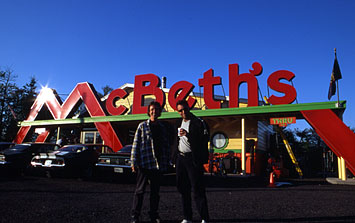‘Scotland, PA’ a tragic remake of a Shakespearean classic

Image: ‘Scotland, PA’ a tragic remake of a Shakespearean classic :Veto Chip Productions Morrissette’s “Scotland, PA” a mediocre attempt at the 1970s-era remake of Shakespeare’s classic play “Macbeth.”:
March 19, 2002
The recent cinematic trend of transposing Shakespeare’s plays into contemporary settings reaches a perplexing crossroad with first-time writer-director Billy Morrissette’s “Scotland, PA,” a “Macbeth” update that places the Bard’s tragedy of guilt and ambition in a mid-1970s Pennsylvania burger stand.
Shakespeare, whose timeless stories allow for a high degree of malleability, is a frequently adapted writer in the history of film. It?s hard to believe, however, that “Scotland, PA” is nothing more than a one-note gimmick.
In Morrissette’s mediocre revision of the play, Duncan’s kingdom becomes Duncan’s Burgers, and the Macbeths become the McBeths, an under-appreciated fry cook (James LeGros), and his unsatisfied wife (Maura Tierney), who work for the doltish Duncan.
Spurred on by his wife, McBeth murders his boss by dunking him headfirst in the fry-o-later and takes control of the restaurant/kingdom from Duncan’s two apathetic sons.
Although McBeth’s innovation of offering chicken pieces with dipping sauces bolsters business, the murder continues to haunt him and his wife, who are driven to insanity and more killings as the police close in on them.
It’s initially amusing to trace the ways that Morrissette fits Shakespeare’s characters and story into the 1970s milieu, but once you get past the skin-deep cleverness of the film’s concept you’re not left with much; Morrissette transposes everything but the point.
Two recent Shakespeare revisions, Michael Almereyda’s “Hamlet” and Tim Blake Nelson’s “O,” update and re-contextualize their source stories without sacrificing the thunderously dark tones of their source material. But the winking adaptation of “Scotland, Pa.” doesn’t follow through on its own premise, transforming the story into a lumbering black comedy.
The connections between the shattering treachery of Shakespeare’s Scotland, the gaudy banality of 1970s American culture and the depersonalized ruthlessness of the fast food wars are only half-heartedly sketched, leaving the film to wallow in arch pointlessness.
The inconsequential fluffiness of Morrissette’s film is exemplified by the miscasting of LeGros (best remembered for his sublime hissy fits in “Living in Oblivion”) as McBeth. LeGros is a likable enough actor with a flair for petulant arrogance, but he’s too delicate a personality to essay the role of the agitated king.
Andy Dick, Amy Smart and Timothy “Speed” Levitch portray the three “witches” that nourish McBeth’s ambition as puckish stoner fortunetellers. It’s a cute idea, but their scenes only underline the film’s atmosphere of vacuous, self-satisfied artifice.
Luckily, Christopher Walken shows up in the second half as McDuff, envisioned here as a tenacious, Columbo-like vegetarian detective, who immediately livens the film with his skeletal glare and uncanny rhythms. He’d be the perfect lead should Morrissette ever attempt to adapt “King Lear.”




























































































































